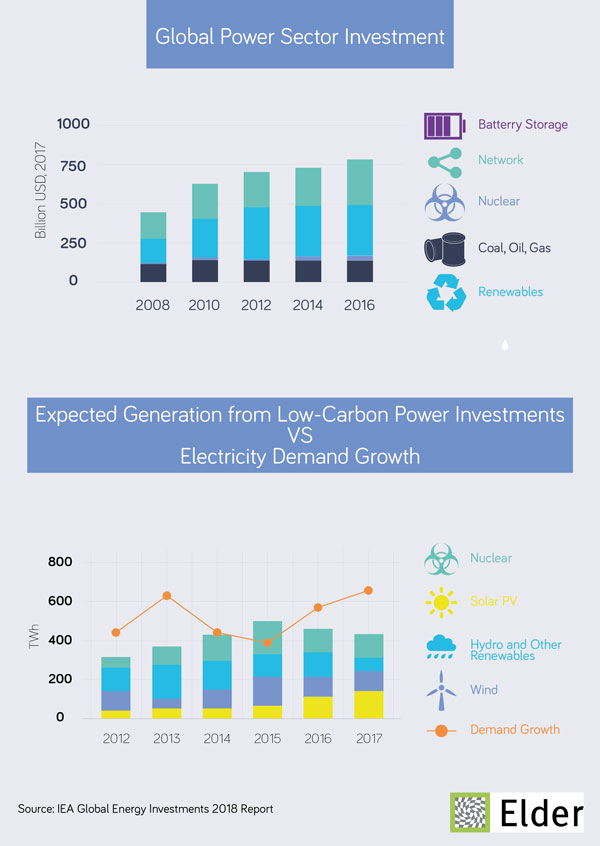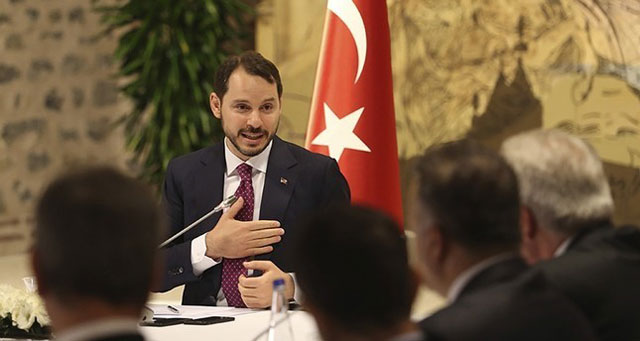
The Industrial and Commercial Bank of China (ICBC) provided a $3.6-billion loan package for the Turkish energy and transportation sector, Treasury and Finance Minister Berat Albayrak said Thursday.
"The $3.6 billion loan package from Chinese financial institutions for energy and transportation sector investments -- private sector, public institutions and banks -- has been completed," Albayrak said in a tweet.
Albayrak also described his negotiations during a visit to China as "fruitful."
In May, Albayrak visited a number of institutions in China, including the ICBC.
ICBC Turkey is the first Chinese bank that started operations in Turkey by acquiring majority shares of a local bank in May 2015. The bank was the first bank to use a TL 450-million ($98.5 million) fund created by the Central Bank of the Republic of Turkey (CBRT) within the framework of a swap agreement signed in 2012 and renewed in 2015.
The entry of the Chinese banks into the Turkish financial sector has helped expand China's investments and business operations in Turkey in other sectors, as well, including in energy, logistics, tourism, transportation, infrastructure and e-commerce.
ICBC's operations in Turkey fall within the scope of China's "Belt and Road Initiative" (BRI), an infrastructure development project designed and launched by Chinese President Xi Jinping in 2013 and spanning over 65 countries.
Source: Daily Sabah
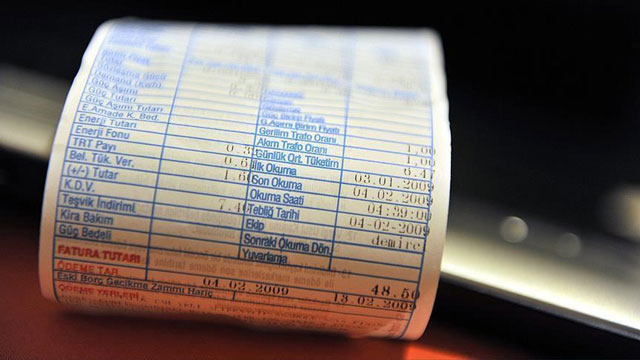
Turkey’s state pipeline operator Botas increased the price of natural gas used for electricity production by 50 percent. The price adjustment was necessary due to a weaker lira pushing oil and natural gas prices higher, as Turkey is mostly dependent on energy imports.
Earlier on Tuesday, the central bank increased its crude oil price assumption to $73 from $68. The increased natural gas prices are based on an exchange rate of 4.86 lira to the dollar, but the payments of producers will be calculated based on the official spot rate of the payment day.
Also on Tuesday, Turkey’s Energy Regulation Authority (EMRA) raised electricity prices by 14 percent for industrial use and by 9 percent for residential use effective Aug. 1.
The latest price increase in electricity took place in April by 2.89 percent.
Source: AA
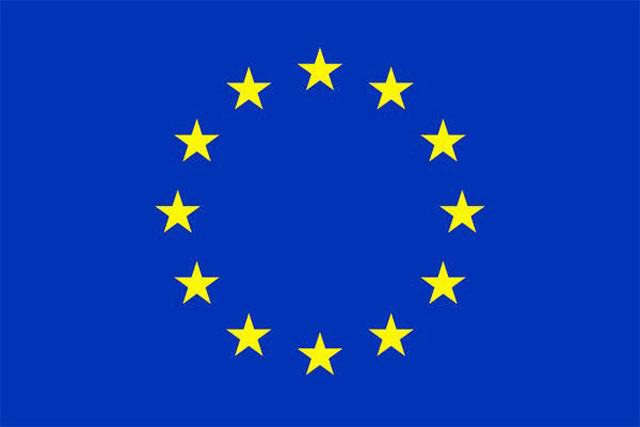
The European Commission will allocate 5 million euros worth grant for the Trans Anatolian Natural Gas Pipeline ( TANAP ), which is a part of the Southern Gas Corridor, envisaging transportation of Azerbaijani gas to Europe, said a message from TANAP consortium.
The grant will be allocated under the CEF Energy Work Program. The funds will be spent on the monitoring and verification of engineering work and Cathodic Protection design procedure under TANAP project.
"European Union countries have decided to invest a total of 48.4 million euros in infrastructure projects and TANAP has been one of the two natural gas projects selected for financial support under the program's first call for proposals,” said the message.
Reportedly, the total amount of grants allocated by EU for TANAP has exceeded 15 million euros since 2014.
A ceremony to launch Phase 0 of TANAP took place June 12 in the Turkish city of Eskisehir and first commercial gas deliveries to Turkey commenced within the Southern Gas Corridor on June 30.
TANAP, together with Trans-Adriatic Pipeline (TAP), is a part of the Southern Gas Corridor, which provides for the transportation of gas from the Azerbaijani field Shah Deniz to Europe.
The initial capacity of TANAP is expected to be 16 billion cubic meters of gas per year. About six billion cubic meters will be supplied to Turkey, and the rest to Europe. After completion of the TAP, the gas will reach Europe in early 2020.
The share distribution in TANAP is as follows: Southern Gas Corridor CJSC - 51 percent, SOCAR Turkey Enerji - 7 percent, Botas - 30 percent, and BP - 12 percent.
The gas from the Azerbaijani Shah Deniz field has already gone through the first segment of the Southern Gas Corridor - from the Sangachal terminal to the expanded South Caucasus Pipeline.
The Southern Gas Corridor, which costs more than $40 billion, is one of the priority projects for the EU and provides for the transportation of 10 billion cubic meters of Azerbaijani gas from the Caspian region through Georgia and Turkey to Europe.
Source: Azer News
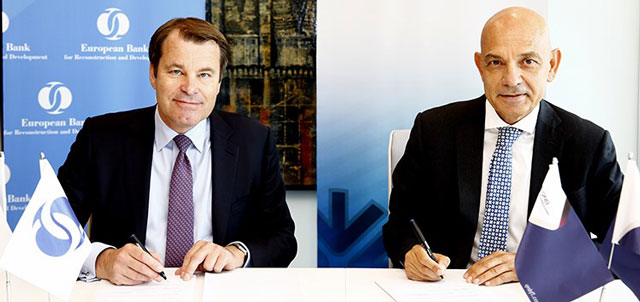
The EBRD is providing a loan of €25 million to QNB Finans Finansal Kiralama A.S., a leasing subsidiary of the Turkish lender QNB Finansbank, to broaden access to finance for the country’s small and medium-sized enterprises (SMEs).
The EBRD loan is extended under the third phase of the Turkey Sustainable Energy Financing Facility (TurSEFF III) which provides financing of €400 million to commercial banks and leasing companies for on-lending to private sector SMEs as well as public sector beneficiaries for sustainable energy investments.
Sub-leases under the credit line will contribute towards building a green economy by facilitating the expansion of resource efficiency and renewable energy lending in Turkey. Examples of possible investments include energy efficiency, water efficiency, waste minimisation and small-scale renewable energy investments.
EBRD First Vice President Jürgen Rigterink, on a visit to Turkey, said: “Our financing provided to QNB Finans Leasing will encourage Turkish companies to install resource-efficient equipment and generate significant benefits in terms of cost savings, avoided energy and capacity costs, as well as reduced emissions. Leasing is a particularly efficient means by which to address the financial needs of local enterprises and is an excellent way to finance capital investments such as high tech equipment offering an attractive alternative to outright purchase.”
Metin Karabiber, General Manager of QNB Finans Leasing, added: “It is the first time that we are working with the EBRD. This significant partnership will enable us to finance renewable energy investments of our SME clients. The financing will help expand resource efficiency in Turkey, while our customers will benefit from long-term funding and reduced costs.”
The loan will also strengthen the financial sector in the country and contribute to the wider proliferation of leasing. Although often a viable alternative to debt financing, the market penetration of leasing in comparison to GDP is one of the lowest in comparable economies.
The EBRD is a major investor in Turkey. Since 2009 it has invested €10 billion in various sectors of the Turkish economy, with almost all investment made in the private sector. In 2017 alone, the EBRD invested €1.6 billion in 51 projects in the country. Nearly a third of this financing was provided in Turkish lira.
Source: EBRD
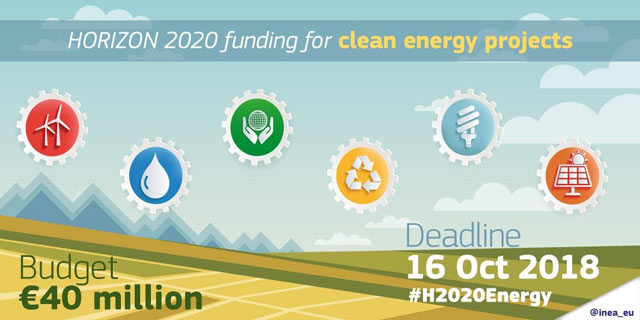
From today, you can apply for funding in two energy topics under the 2018-2020 Horizon 2020 Work Programme. The total available funding is €40 m.
The topics open for applications are:

The projects will be selected for funding in two-stage evaluation.
First, candidates should submit short project proposals by 16 October 2018. They will be then informed within three months after the deadline if they have qualified to the second stage of the selection process.
If so, they will be invited to submit full project proposals by 25 April 2019.
The final decision about which projects will receive EU funding will be known the latest by 25 September 2019.
The focus of the above funding opportunities is to support research and innovation activities in relation with renewable energy. Please note that there might be further EU funding opportunities in energy research announced on the Participant Portal.
What are the requirements for participation?
The requirements for submitting a research proposal are detailed in the relevant call documents published on each topic page. Please also consult the General Annexes (pdf) of the H2020 Work Programme for 2018-2020 for rules on funding, such as the list of countries that can apply for funding, standard eligibility criteria, submission rules, types of projects and their funding rates and other useful information.
How to apply?
Applicants have to submit their proposal electronically, following the link from the topic page on the Participant Portal. Please follow the guidelines on proposal submission and evaluation (pdf). For all questions related to Horizon 2020, please contact the Research Enquiry Service.
How will the grants be awarded?
The submitted proposals are evaluated by external experts drawn from the European Commission's independent expert database. Grant agreements will be signed with the successful applicants max. eight months after the deadline.
Become an expert
External evaluators of project proposals are drawn from the European Commission's independent expert database. The Commission is looking to expand the database through a call for experts covering a very broad range of fields. If you fit the expert profile rather than that of an applicant and would like to be considered as a proposal evaluator, sign up in the Participant Portal.
Source: European Commission
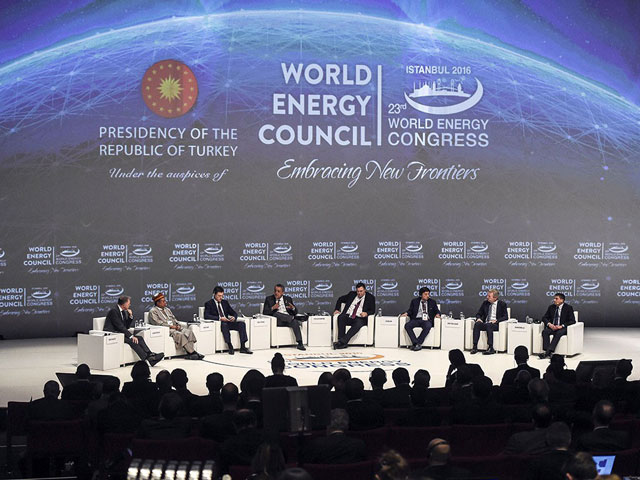
The World Energy Council has announced that Russia has won the bid to host the 2022 World Energy Congress, a triennial gathering of the global energy sector.
The announcement follows a vote by the Council’s member countries between Portugal, Russia and the USA. St Petersburg will be the site of the 25th World Energy Congress.
Dr Christoph Frei, Secretary General of the Council, commented: “On behalf of the Council I want to congratulate Russia for winning the bid to host the 2022 Congress and thank all bidding countries for their excellent bids. The Portuguese, Russian and USA bid teams presented strong cases to host the event and it is clear that each of these cities would be an exciting and accomplished destination to host a World Energy Congress.”
The World Energy Council has announced that Russia has won the bid to host the 2022 World Energy Congress, a triennial gathering of the global energy sector.
The announcement follows a vote by the Council’s member countries between Portugal, Russia and the USA. St Petersburg will be the site of the 25th World Energy Congress.
Dr Christoph Frei, Secretary General of the Council, commented: “On behalf of the Council I want to congratulate Russia for winning the bid to host the 2022 Congress and thank all bidding countries for their excellent bids. The Portuguese, Russian and USA bid teams presented strong cases to host the event and it is clear that each of these cities would be an exciting and accomplished destination to host a World Energy Congress.”
23th Congress was held in Istanbul in 2016, and 24th will be held in Abu Dhabi in 2019.
Source: Industry Europe
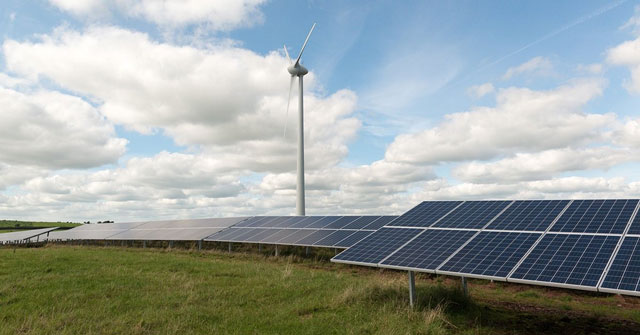
Three solar farms in the Netherlands soon completed as part of Vattenfall’s 100 million euro solar investment plan.
In Dutch Velsen, the first panels for Vattenfall’s next solar power farm have just been installed. The rest of the roughly 7.300 panels will be mounted in the course of a few weeks. A specialty of the Velsen solar farm is that it is crowdfunded by customers of Nuon, Vattenfall’s Dutch subsidiary.
During the next few months Vattenfall will build two more large-scale solar power plants in the country, Eemshaven and Hemweg. In total the three solar farms will comprise over 30.000 solar panels with a total capacity of 10 MW. But this is just a mere start. In the next years Vattenfall will invest 100 million euro in solar power.
Benefits of co-location: cheaper and quicker
All three solar farms are co-located with existing gas-fired CHP plants. Co-location means that the solar farms can utilize existing grid connections and also the space at the plant. In Wales Vattenfall has co-located a 5 MW solar farm with a wind farm called Parc Cynog and next year a 40 MW solar power facility is planned in connection to the Dutch wind farm Haringvliet.
“Co-location offers many advantages to us, since we can develop the projects quicker and profit from synergies, so this is something we will definitely do more of. At the moment, the Dutch market is very attractive and we develop many co-located and stand-alone projects there. But costs of solar PV are dropping fast and we are also developing projects in the UK, Sweden and Germany. We see a high potential for solar power in the next years,” says Claus Wattendrup, Vice President of Vattenfall’s department for Solar & Batteries, which is part of Vattenfall’s Business Area Wind.
Source: Vattenfall
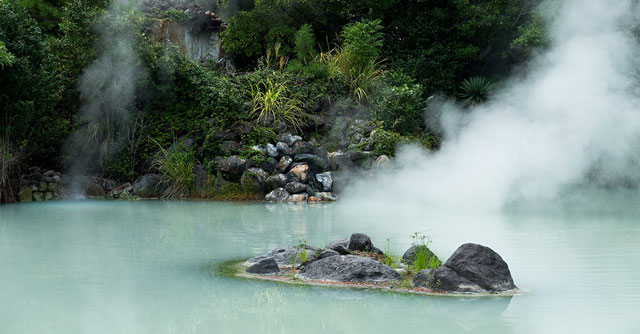
Thousands of natural hot springs (or onsen) dot Japan’s countryside, providing a haven for relaxation and contemplation for millions of people. For thousands of years, they have been an important part of the historical and social fabric of the country, and they are represented everywhere from famous ukioy-e woodblock prints from the 18th century to contemporary sitcoms.
Today, however, they have the potential to be an important part of the transformation of Japan’s energy sector, with a power output equivalent to 23 gigawatts (GW) lying beneath the surface in the form of geothermal energy, the world’s third-largest store. The world’s installed capacity for geothermal power was 12.9 gigawatts (GW) in 2017, with a levelised cost of electricity (LCOE) for recent projects ranging from USD 0.04 to around USD 0.13 per kilowatt-hour.
Geothermal power plants are not new to Japan. The first geothermal plant in the country opened in 1924 in Bepphu, with the steam also being used to heat houses and cook food in restaurants. However, it wasn’t until 1952 when Japan’s first commercial geothermal power station opened, in the city of Hachimantai in northern Japan. Built by Japan Metal & Chemicals and with turbines by Toshiba, the plant originally provided about 9.5 MW of power, about 40% of its output today, with the residual hot water used for agricultural applications.
Today, Toshiba is the world’s largest supplier of geothermal turbines, followed by Mitsubishi and Fuji, also Japanese companies. Japan is also one of the world’s largest developers of geothermal projects outside of the country. In Indonesia, Japanese companies are currently financing and building the Sarulla plant, whose output once completed will be 320 MW, the world’s largest. Japanese companies also support Kenya’s geothermal-powered energy transformation, providing turbines, supplying equipment, and constructing mega-projects like the 158 MW Olkaria V steam power plant in Naivasha.
But despite Japan’s technical and construction preeminence and its significant energy potential, there are only around twenty geothermal plants in Japan, with a total output capacity of around 535 MW, only 0.3% of the country’s total electricity generation. High upfront costs and rigorous regulatory processes are some of the reasons that the Wasabizawa plant, currently under construction in Akita prefecture, is the first large-scale geothermal project in about 20 years.
However, in the wake of the Fukushima nuclear disaster the Japanese government introduced new policies to accelerate geothermal power plant deployment. These included streamlined procedures for the approval of projects in national parks and, crucially, a new higher feed-in tariff (FIT) for small geothermal plants to more than one-and-a-half times of that of larger facilities. This made it profitable to build plants with an output below 7.5 MW, which do not require environmental impact assessments and can be built in around half the time of larger plants.
These policies have not been unopposed. More than half of the geothermal sources are located around national parks or near the country’s 27,000 thermal springs that onsen rely on for their hot water supply. Critics believe that geothermal projects will adversely affect water supply or quality, or that the plants will have a detrimental impact on hot spring resorts or national parks.
As a result, an important role of the small-scale geothermal plants built since 2012 has been to work closely with onsen operators, hotels and inns to prove that small-scale geothermal power generation can coexist with tourism facilities, without negatively impacting Japan’s natural beauty.
Source: IRENA
This article provides an introductory explanation of blockchain for those who are completely unfamiliar with the subject matter. The concept of blockchain basically comes down to it being a distributed ledger, which provides transparency, security and irreversibility - and therefore most of all trust - between two parties to transact without a third party involved. Although the technology was initially invented to create an online (crypto) currency to bypass banks, direct, transparent and trustworthy transactions soon showed their potential beyond just the financial sector. Adoption of the technology is exemplified through the rapid appearances of start-ups, pilot projects, alliances and so forth in sectors such as insurance, supply chain management, healthcare and the energy sector.
Please click here to read the full report.
Agenda
Global Power & Energy Exhibition 2018
September 17 – 20 / Barcelona, Spain
Global District Energy Days
September 25 - 27 / Helsinki, Finland
Global Wind Summit
September 25 – 28 / Hamburg, Germany
11th International Conference on Energy and Climate Change
October 10 – 12 / Athens, Greece
